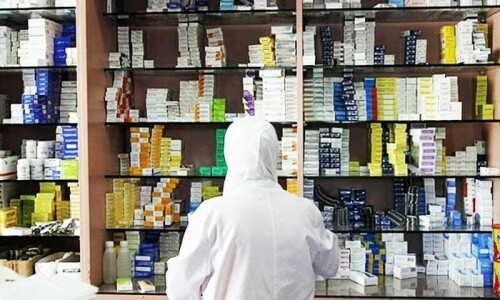• Several key medicines and non-essential drugs are not available at pharmacies as black market flourishes
• Govt takes notice of crisis, officials asked to submit report on remedial measures
KARACHI: While people are still struggling to pay inflated electricity bills amid skyrocketing inflation, a large number of patients across the province, and those who are on medication, are hit by severe shortage of several essential medicines along with escalating drugs prices. Dozens of non-essential medicines are also not available at pharmacies, Dawn has learnt.
The shortage is causing serious problems for patients and in some cases has put lives in danger.
The province is severely affected by shortage of key medicines, including biological products, vaccines, immunoglobulins for treatment of cancers, insulin for diabetes management and several other products, which are not available in the market, a government official confirmed to Dawn.
“Not only essential medicines, there are dozens of non-essential medicines, which are also not available at pharmacies across Pakistan because manufacturers have stopped or reduced the import of Active Pharmaceutical Ingredients (API) or raw material for manufacturing medicines,” said an industry source while blaming the growing value of US dollar for stoppage of imports.
“Amid growing devaluation of rupee and rising US dollars, the importers have stopped importing finished goods and medicines’ raw material,” the industry sources added.
Spurious drugs
As a result, they said, market was flooded with smuggled and counterfeit medicines, which were being brought to the country from Afghanistan, Iran and India.
Despite the fact that many medicines are temperature-sensitive, many essential medicines are being smuggled in ordinary trucks without cold chain management.
The cold chain means uninterrupted temperature-control of drugs on the journey from their site of manufacture all the way to where they are administered.
“If the cold chain is not properly maintained, vaccine potency may be lost, resulting in an unusable vaccine supply, which renders them useless,” experts told Dawn.
Patients and their families are struggling to get essential medicines like insulin, Anti-D Immunoglobulin, cancer-treatment medicines and several other important drugs whose alternates are not available in market, a market survey showed.
“Amid growing crisis people are compelled to buy drugs from black marketeers at exorbitant prices,” said a retailer.
Govt concedes shortage
Admitting shortage of essential and life-saving medicines across the province, the Sindh health authorities on Sunday decided to take police and district administration on board for controlling the crisis of drugs shortage and the menace of smuggling of medicines resulting in flourishing black market of essential drugs.
The authorities have sought a report from the relevant officials on their action within 48 hours.
In a letter to the chief drug inspector, the Sindh director general of health has called the recent shortage a result of black market and hoarding by retailers and wholesalers.
In order to reduce public miseries, immediate activation of all relevant teams carrying out strict vigilance along with action is advised on wholesale and open market outlets as a part of ‘menace containment measures’ related to shortage and black market of essential and life-saving drugs in all districts with particular emphasis on Karachi Division and Hyderabad City under necessary coordination of respective DHOs (district health officers), deputy commissioners and police authorities, said the Sindh DG health in the letter sent to the chief drug inspector.
“Detailed report in that regard be submitted in-person to the office of respected minister and secretary health within 48 hours,” the letter said.
Although the authorities blamed the black market and hoarding for shortage, sources in pharmaceutical industry said that massive rupee devaluation and imposition of recent four per cent sales tax on imported medicines was behind the existing crisis.
“For instance, an immunoglobulin, which was available till a few weeks back at Rs6,000, is now being sold between Rs14,000 to Rs16,000. Black marketeers are selling the stock available with them at exorbitant prices, but nobody is willing to safeguard the interests of patients.”
Sindh caretaker Health Minister Dr Saad Khalid Niaz agreed that the growing value of US dollar might have affected the import and production of medicines, but he insisted that there were also some elements which were needed to be fixed at provincial level to improve the situation to some extent.
“That [devaluation of rupee] could have been one of the reasons,” he told Dawn. “What we are doing are the measures which fall under our mandate. There are issues which fall under the federal government, but we can check black market and artificial shortages.”
He said that he had chaired back-to-back meetings on Sunday and gave clear directives to health officials and departments for taking a strong action in this regard. “I would also talk to federal minister on Monday [today] for better coordination and cooperation on these lines.”
Published in Dawn, September 4th, 2023













































Dear visitor, the comments section is undergoing an overhaul and will return soon.